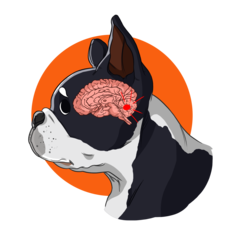One of the most challenging things as a pet parent is learning that your beloved dog has a severe health issue. A brain tumor in dogs is definitely a scary diagnosis. Suspecting that your dog has a brain tumor or getting a diagnosis of brain tumors in dogs is undoubtedly very upsetting. It is imperative that pet parents research brain tumors in dogs and become as educated as they can. This is especially true if your pet has received a diagnosis.
TABLE OF CONTENTS
1. What Exactly is a Brain Tumor in Dogs?
2. Two Kinds of Brain Tumors
3. What Are Canine Brain Tumor Symptoms?
4. Top Symptoms of Brain Tumors in Dogs
5. What Causes Dog Brain Tumors?
6. Which Dog Breeds Are At Higher Risk for Brain Tumors?
7. How Do Dog Brain Tumors Get Diagnosed?
8. What Happens After Canine Brain Tumor Treatment?
9. What Is The Prognosis For Brain Tumors in Dogs?
10. Can Brain Tumors Be Prevented?
11. Are There Natural Options For Canine Brain Tumors?
12. Final Say on Brain Tumors in Dogs
In this article, we will go over everything that you may need to know about this health concern. At Innovetpet, we understand that pet parents are genuinely worried about their pets, and we want you to be educated and well-informed on any health problems or concerns that you may have about your furry friend.
What Exactly is a Brain Tumor in Dogs?

First of all, a tumor is the wording that refers to abnormal cell growth in the body. A brain tumor would apply to abnormal cell growth in the brain. Brain tumors in dogs can grow in the brain but could also be in another part of the cranium.
Brain tumors in dogs can affect any dog of any age. There are some breeds that are more susceptible to having canine brain tumors. Also, it usually occurs in senior canines more than in younger ones.
Two kinds of brain tumors are found in canines.
They are termed as primary or secondary, and the diagnosis will have a lot to do with the treatment that is recommended by the veterinarian.
Two Kinds of Brain Tumors
The two kinds of canine brain tumors are primary and secondary. The differences between them will be explained as well as what types of treatments are typically experienced.
Secondary Brain Tumors
A secondary brain tumor is a kind of tumor that has come from cancer that was formed in another part of the body first. Secondary dog brain tumors occur when cancer spreads to the brain. This process is called metastasis. It can come from any type of cancer. Unfortunately, a secondary brain tumor means that cancer has spread and is no longer contained. This can occur if a diagnosis has not come quickly or if the treatment for the originating cancer has not worked in the way that was hoped. Therefore, secondary brain tumors generally have a poorer prognosis than primary brain tumors.
Primary Brain Tumors
Primary brain tumors in dogs are when the cancer cells originate in the brain or cranium. If discovered quickly, a primary brain tumor can have an excellent prognosis. If you suspect that something is not right with your dog, it is vital to get them to your trusted vet as soon as possible. That way, if anything is wrong, it can be treated immediately and possibly have a positive outcome.
What Are Canine Brain Tumor Symptoms?
Getting a diagnosis means that there is a better chance of resolving any health issues that have been found. The symptoms of brain tumors in their early stages can be hard to distinguish from other common health issues. These are called non-specific symptoms.
Non-specific symptoms can make it hard for pet parents to know if something is very wrong with their dog. That’s why, as a concerned pet parent, evaluation from a trusted vet as soon as possible is crucial in figuring out if something serious is going on and if immediate treatment is needed.
Top Symptoms of Brain Tumors in Dogs
Here are some of the most common symptoms of brain tumors in dogs:
If you notice that your dog is displaying some of these symptoms, it is imperative to get them to the vet as soon as possible. It is better to be safe than sorry when it comes to your beloved pet. Getting them into the veterinarian is the best course of action.
The symptoms and behaviors will be much more noticeable as the tumor progresses. Your dog may have increased numbers of seizures, lose his or her balance more often, or even display a changing personality. Therefore, early treatment is absolutely vital to the prognosis of canine brain tumors.
What Causes Dog Brain Tumors?
There are really no proven reasons to why dogs get brain tumors. There are only theories that scientists and medical experts have come up with. For example, the theories of canine dog brain tumor origination are that they come from diets, chemicals, genetic components, weak immune systems, and environmental toxins.





